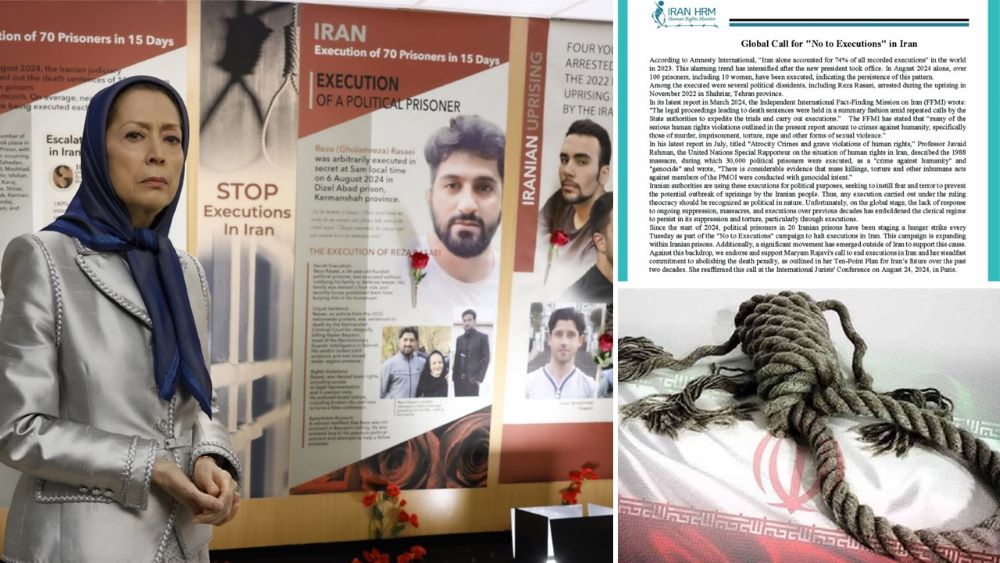
The Iran Human Rights Monitor (Iran HRM) issued a compelling statement on October 10, 2024, amplifying the global demand to halt executions in Iran. Backed by 1,500 dignitaries from 78 nations, this appeal responds to the call made by Maryam Rajavi. The statement highlights the disturbing rise in executions under the leadership of Masoud Pezeshkian, Iran’s current president, noting that hundreds of prisoners, including women, were executed in just August 2024 alone.
Referring to data from Amnesty International, Iran HRM emphasized that Iran was responsible for 74% of the world’s recorded executions in 2023—a figure that has only increased since Pezeshkian took office. The Independent International Fact-Finding Mission on Iran (FFMI) reported in March 2024 that many death sentences were issued following “summary” trials. The FFMI concluded that the Iranian regime’s human rights violations, including murder, imprisonment, torture, and sexual violence, amount to “crimes against humanity.”
In his July 2024 report, United Nations Special Rapporteur on Iran, Professor Javaid Rehman, reiterated these concerns, labeling the 1988 massacre of 30,000 political prisoners as “genocide” and condemning the regime’s ongoing mass executions, torture, and other acts of violence against political opposition with “genocidal intent.”
Iran HRM also emphasized that the regime uses executions to suppress dissent and maintain control through fear. “Iranian authorities are carrying out these executions for political reasons, using terror to quash potential uprisings,” the statement reads.
Since early 2024, political prisoners in 22 Iranian prisons have organized weekly hunger strikes as part of the “No to Executions” campaign, which has gained significant international attention. Human rights activists and Iranian dissidents have rallied behind Maryam Rajavi’s call for the abolition of the death penalty. Mrs. Rajavi, President-elect of the National Council of Resistance of Iran (NCRI), reaffirmed her position during the International Jurists’ Conference on August 24, 2024, in Paris.
Conference Featuring Distinguished Jurists, Legal Experts, and Eminent International #HumanRights Advocates
— Maryam Rajavi (@Maryam_Rajavi) August 27, 2024
The urgent need to hold Iranian regime leaders accountable for executions and massacres and end their impunity#Iranhttps://t.co/Kgaz9biYJN pic.twitter.com/e2XYyTJWpo
Iran HRM concluded its statement by urging the global community to unite against the regime’s systematic human rights violations and to support the growing “No to Executions” campaign.
The full text of the Iran HRM statement follows:
Global Call for “No to Executions” in Iran
According to Amnesty International, “Iran alone accounted for 74% of all recorded executions” in the world in 2023. This alarming trend has intensified after the new president took office. In August 2024 alone, over 100 prisoners, including 10 women, have been executed, indicating the persistence of this pattern.
Among the executed were several political dissidents, including Reza Rasaei, arrested during the uprising in November 2022 in Shahriar, Tehran province.
In its latest report in March 2024, the Independent International Fact-Finding Mission on Iran (FFMI) wrote: “The legal proceedings leading to death sentences were held in a summary fashion amid repeated calls by the State authorities to expedite the trials and carry out executions.” The FFMI has stated that “many of the serious human rights violations outlined in the present report amount to crimes against humanity, specifically those of murder, imprisonment, torture, rape and other forms of sexual violence.”
In his latest report in July, titled “Atrocity Crimes and grave violations of human rights,” Professor Javaid Rehman, the United Nations Special Rapporteur on the situation of human rights in Iran, described the 1988 massacre, during which 30,000 political prisoners were executed, as a “crime against humanity” and “genocide” and wrote, “There is considerable evidence that mass killings, torture and other inhumane acts against members of the PMOI were conducted with genocidal intent.”
Iranian authorities are using these executions for political purposes, seeking to instill fear and terror to prevent the potential outbreak of uprisings by the Iranian people. Thus, any execution carried out under the ruling theocracy should be recognized as political in nature. Unfortunately, on the global stage, the lack of response to ongoing suppression, massacres, and executions over previous decades has emboldened the clerical regime to persist in its suppression and torture, particularly through executions.
Since the start of 2024, political prisoners in 20 Iranian prisons have been staging a hunger strike every Tuesday as part of the “No to Executions” campaign to halt executions in Iran. This campaign is expanding within Iranian prisons. Additionally, a significant movement has emerged outside of Iran to support this cause.
Against this backdrop, we endorse and support Maryam Rajavi’s call to end executions in Iran and her steadfast commitment to abolishing the death penalty, as outlined in her Ten-Point Plan for Iran’s future over the past two decades. She reaffirmed this call at the International Jurists’ Conference on August 24, 2024, in Paris.